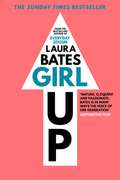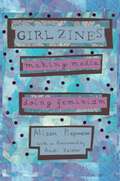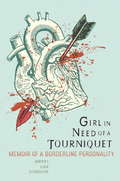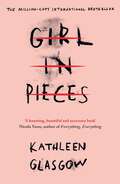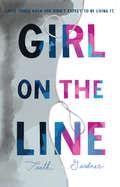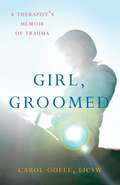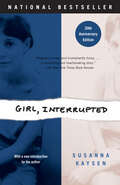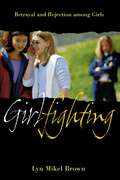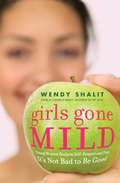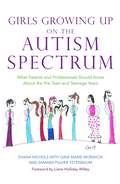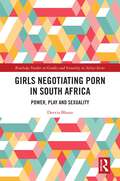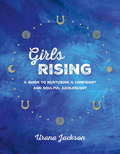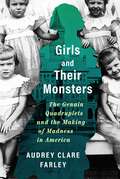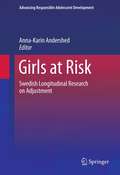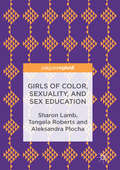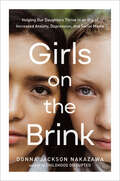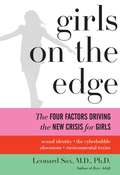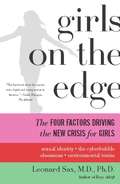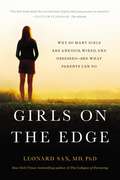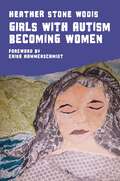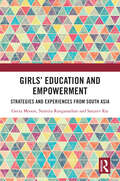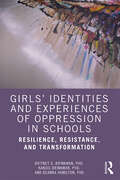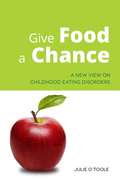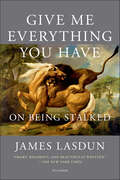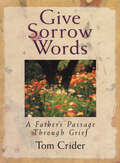- Table View
- List View
Girl Up: Kick Ass, Claim Your Woman Card, and Crush Everyday Sexism
by Laura BatesThey told you you need to be thin and beautiful. They told you to wear longer skirts, avoid going out late at night and move in groups - never accept drinks from a stranger, and wear shoes you can run in more easily than heels. They told you to wear just enough make-up to look presentable but not enough to be a slut; to dress to flatter your apple, pear, hourglass figure, but not to be too tarty. They warned you that if you try to be strong, or take control, you'll be shrill, bossy, a ballbreaker. Of course it's fine for the boys, but you should know your place. They told you 'that's not for girls' - 'take it as a compliment' - 'don't rock the boat' - 'that'll go straight to your hips'. They told you 'beauty is on the inside', but you knew they didn't really mean it. Well I'm here to tell you something different. Hilarious, jaunty and bold, GIRL UP exposes the truth about the pressures surrounding body image, the false representations in media, the complexities of a sex and relationships, the trials of social media and all the other lies they told us.
Girl Zines: Making Media, Doing Feminism
by Alison PiepmeierThe first book-length exploration of the quirky feminist bookletsWith names like The East Village Inky, Mend My Dress, Dear Stepdad, and I’m So Fucking Beautiful, zines created by girls and women over the past two decades make feminism’s third wave visible. These messy, photocopied do-it-yourself documents cover every imaginable subject matter and are loaded with handwriting, collage art, stickers, and glitter. Though they all reflect the personal style of the creators, they are also sites for constructing narratives, identities, and communities.Girl Zines is the first book-length exploration of this exciting movement. Alison Piepmeier argues that these quirky, personalized booklets are tangible examples of the ways that girls and women ‘do’ feminism today. The idiosyncratic, surprising, and savvy arguments and issues showcased in the forty-six images reproduced in the book provide a complex window into feminism’s future, where zinesters persistently and stubbornly carve out new spaces for what it means to be a revolutionary and a girl. Girl Zines takes zines seriously, asking what they can tell us about the inner lives of girls and women over the last twenty years.
Girl in Need of a Tourniquet: Memoir of a Borderline Personality
by Merri Lisa JohnsonAn honest and compelling memoir, Girl in Need of a Tourniquet is Merri Lisa Johnson's account of her borderline personality disorder and how it has affected her life and relationships. Johnson describes the feeling of "bleeding out" - unable to tell where she stopped and where her partner began. A self-confessed "psycho girlfriend," she was influenced by many emotional factors from her past. She recalls her path through a dysfunctional, destructive relationship, while recounting the experiences that brought her to her breaking point. In recognizing her struggle with borderline personality disorder, Johnson is ultimately able to seek help, embarking on a soul-searching healing process. It's a path that is painful, difficult, and at times heart-wrenching, but ultimately makes her more able to love and coexist in healthy relationships.
Girl in Pieces: The million-copy TikTok sensation
by Kathleen GlasgowA deeply moving portrait of one girl's journey from self-harm to self-acceptance from bestselling author, Kathleen Glasgow &‘A haunting, beautiful and necessary book&’ Nicola Yoon, author of Everything, Everything THIS LIMITED, SPECIAL EDITION includes deleted scenes, a playlist and a personal note from the author. While stocks last. Not yet available in eBook. Charlie Davis is in pieces. At seventeen, she&’s already lost more than most people lose in a lifetime. But she&’s learned how to forget it through cutting; the pain washes out the sorrow until there is nothing but calm. She doesn't have to think about her father or what happened under the bridge. Her best friend, Ellis, who is gone forever. Or the mother who has nothing left to give her. Kicked out of a special treatment center when her insurance runs out, Charlie finds herself in the bright and wild landscape of Tucson, Arizona, where she begins the unthinkable: the long journey of putting herself back together. Kathleen Glasgow is also the author of How to Make Friends with the Dark and You'd Be Home Now 'Girl, Interrupted meets Speak.' Refinery29 'Glasgow&’s poetic writing brings Charlie&’s mind to life as she tries to find a path to recovery.' Independent
Girl on the Line
by Faith GardnerA story that begins where too many others end, this stunningly written and unflinchingly authentic tale of love, loss, and hope will touch fans of All the Bright Places and Girl in Pieces.Life’s tough when you didn’t expect to be living it. But now that Journey has a future, she apparently also has to figure out what that future’s supposed to look like.Some days the pain feels as fresh as that day: the day she attempted suicide. Her parents don’t know how to speak to her. Her best friend cracks all the wrong jokes. Her bipolar II disorder feels like it swallows her completely.But other days—they feel like revelations. Like meeting the dazzling Etta, a city college student who is a world unto herself. Or walking into the office of the volunteer hotline, and discovering a community as simultaneously strong and broken as she is.Or uncovering the light within herself that she didn’t know existed.Praise for Faith Gardner's The Second Life of Ava Rivers:"A beautiful, moving, and thoughtful story about how far we're willing to go for family." —Kathleen Glasgow, New York Times bestselling author of Girl in Pieces“This remarkable novel reproduces the personal and family trauma associated with the loss and recovery of a missing child. The Second Life of Ava Rivers is an enthralling tale.” —Voice of Youth Advocates (VOYA) (starred review)"Gardner’s unforgettable voice blends Jodi Picoult’s emotional, ripped-from-the-headlines storytelling with Mindy McGinnis’s unflinchingly honest protagonists." —Booklist (starred review)“Gardner brings a unique tenderness focused on the human dynamics of creating family and individual identity in the face of tragedy.” —Bulletin of the Center for Children’s Books (starred review)
Girl, Groomed
by Carol OdellFans of Lori Gottlieb&’s, Maybe You Should Talk to Someone, and horse lovers alike will appreciate this therapist&’s intimate journey in &“the other chair&” as she strives to untangle the trauma from her equestrian childhood that now threatens her marriage.Raw and riveting, Girl, Groomed is seasoned psychotherapist Carol Odell&’s evolving story of coming to terms with the impacts of her own history of sexual abuse and violence at the hands of a predatory horse trainer who, for far too much of her young life, held all the reins. Set in the equestrian world of Virginia, this candid memoir details how, starting at ten years old, Carol falls under the spell of Clarentine, the charismatic—and explosively violent—owner of the stables just down the hill from her house. In tandem with that story, Carol examines the multi-faceted consequences of the complex trauma that resulted from the exploitive relationship Clarentine cultivated with her—including the resulting crisis she blindly imposes on her marriage. Chapters toggle back and forth between scenes of her childhood growing up jumping horses on the show circuit and the therapy sessions she later undergoes as an adult. Using her own journey as an example, Carol demonstrates in this insightful memoir how unintegrated trauma limits us and our connection with others—and how the work of uncovering and reintegrating &“what we do with what happens to us&” can become the very source of our liberation.
Girl, Interrupted
by Susanna KaysenA nonfictional account by the author of her life as a teenager. The story of her life in and out of a psychiatric hospital.
Girlfighting: Betrayal and Rejection among Girls
by Lyn Mikel BrownOffers a developmental explanation for girlfighting and pathways to build girl alliesFor some time, reality TV, talk shows, soap-operas, and sitcoms have turned their spotlights on women and girls who thrive on competition and nastiness. Few fairytales lack the evil stepmother, wicked witch, or jealous sister. Even cartoons feature mean and sassy girls who only become sweet and innocent when adults appear. And recently, popular books and magazines have turned their gaze away from ways of positively influencing girls' independence and self-esteem and towards the topic of girls' meanness to other girls. What does this say about the way our culture views girlhood? How much do these portrayals affect the way girls view themselves?In Girlfighting, psychologist and educator Lyn Mikel Brown scrutinizes the way our culture nurtures and reinforces this sort of meanness in girls. She argues that the old adage “girls will be girls”—gossipy, competitive, cliquish, backstabbing— and the idea that fighting is part of a developmental stage or a rite-of-passage, are not acceptable explanations. Instead, she asserts, girls are discouraged from expressing strong feelings and are pressured to fulfill unrealistic expectations, to be popular, and struggle to find their way in a society that still reinforces gender stereotypes and places greater value on boys. Under such pressure, in their frustration and anger, girls (often unconsciously) find it less risky to take out their fears and anxieties on other girls instead of challenging the ways boys treat them, the way the media represents them, or the way the culture at large supports sexist practices. Girlfighting traces the changes in girls' thoughts, actions and feelings from childhood into young adulthood, providing the developmental understanding and theoretical explanation often lacking in other conversations. Through interviews with over 400 girls of diverse racial, economic, and geographic backgrounds, Brown chronicles the labyrinthine journey girls take from direct and outspoken children who like and trust other girls, to distrusting and competitive young women. She argues that this familiar pathway can and should be interrupted and provides ways to move beyond girlfighting to build girl allies and to support coalitions among girls.By allowing the voices of girls to be heard, Brown demonstrates the complex and often contradictory realities girls face, helping us to better understand and critique the socializing forces in their lives and challenging us to rethink the messages we send them.
Girls Gone Mild: Young Women Reclaim Self-Respect and Find It's Not Bad to Be Good
by Wendy ShalitAt twenty-three, Wendy Shalit punctured conventional wisdom with A Return to Modesty, arguing that our hope for true lasting love is not a problem to be fixed but rather a wonderful instinct that forms the basis for civilization. Now, in Girls Gone Mild, the brilliantly outspoken author investigates an emerging new movement. Despite nearly-naked teen models posing seductively to sell us practically everything, and the proliferation of homemade sex tapes as star-making vehicles, a youth-led rebellion is already changing course.In Seattle and Pittsburgh, teenage girls protest against companies that sell sleazy clothing. Online, a nineteen-year-old describes her struggles with her mother, who she feels is pressuring her to lose her virginity. In a small town outside Philadelphia, an eleventh-grade girl, upset over a &“dirty book&” read aloud in English class, takes her case to the school board. These are not your mother&’s rebels.In an age where pornography is mainstream, teen clothing seems stripper-patented, and &“experts&” recommend that we learn to be emotionally detached about sex, a key (and callously) targeted audience–girls–is fed up. Drawing on numerous studies and interviews, Shalit makes the case that today&’s virulent &“bad girl&” mindset most truly oppresses young women. Nowadays, as even the youngest teenage girls feel the pressure to become cold sex sirens, put their bodies on public display, and suppress their feelings in order to feel accepted and (temporarily) loved, many young women are realizing that &“friends with benefits&” are often anything but. And as these girls speak for themselves, we see that what is expected of them turns out to be very different from what is in their own hearts.Shalit reveals how the media, one&’s peers, and even parents can undermine girls&’ quests for their authentic selves, details the problems of sex without intimacy, and explains what it means to break from the herd mentality and choose integrity over popularity. Written with sincerity and upbeat humor, Girls Gone Mild rescues the good girl from the realm of mythology and old manners guides to show that today&’s version is the real rebel: She is not &“people pleasing&” or repressed; she is simply reclaiming her individuality. These empowering stories are sure to be an inspiration to teenagers and parents alike.
Girls Growing Up on the Autism Spectrum: What Parents and Professionals Should Know About the Pre-Teen and Teenage Years
by Shana Nichols Liane Holliday Willey Ginamarie Moravcik Samara Pulver-Tetenbaum'This book is not only reassuring; it is inspiring, and bursting with ideas and achievable strategies. The authors write with authority and conviction, and tackle even the most difficult and delicate of topics. If ever you needed to be convinced that girls with ASD can overcome the difficulties and challenges of puberty and adolescence, have successful friendships and relationships and enjoy a healthy sexuality, then take the time to read this book - it is a must-have for families, teachers and therapists alike.' -Sarah Attwood, author of Making Sense of Sex: A Forthright Guide to Puberty, Sex and Relationships for People with Asperger's Syndrome Growing up isn't easy, and the trials and tribulations of being a teenager can be particularly confusing for girls with Autism Spectrum Disorders (ASDs). This book covers all the concerns commonly faced by girls with ASDs and their parents, from periods and puberty to worries over friendships and 'fitting in'. Taking a good look at these adolescent issues, and many more, within the context of specific areas of difficulty for girls with ASDs, the authors provide families with the knowledge and advice they need to help their daughters - and the whole family - through the teenage years. This book addresses core issues such as cognition, communication, behavior, sensory sensitivities, and social difficulties; it gives candid and realistic advice on a wide range of important teenage topics. Providing professional perspectives alongside personal experiences from mothers, daughters and educators, this is a unique and indispensible guide for families and their daughters with ASDs, as well as the teachers and professionals who work with them.
Girls Negotiating Porn in South Africa: Power, Play and Sexuality (Routledge Studies on Gender and Sexuality in Africa)
by Deevia BhanaThe book investigates how teenage girls in South Africa encounter and consume pornography, situating their experiences within wider sociocultural and affective relations of power. It focuses on girls’ online playful and pleasurable pursuits as they explore and expand upon their sexual curiosities. In this digital moment, the book directs us to the multi-layered meanings around porn, as an everyday normative experience. The book takes on an interdisciplinary approach drawing from and inspired by new feminist materialism and assemblage theorising. For teenage girls porn is freely available to see in billboards, magazines, books, on television, music videos, games, online streaming and social media sites. Girls do not have to view hardcore porn to see porn: it is everywhere. It argues that girls’ online playful adventures are a critical site for learning, developing, and negotiating gender and sexuality. These meanings are constitutive of pleasure and the pursuit of learning sexually, but they also provide a launchpad for girls to contest race, gender, and heterosexual domination while opening up online porn to broader interrogation and critique. The book will be of interest to researchers across African studies, sociology, psychology, anthropology, youth, gender and sexuality studies, porn studies, and childhood studies.
Girls Rising: A Guide to Nurturing a Confident and Soulful Adolescent
by Urana JacksonThis guide for adults working with adolescent girls will help them explore and develop their emotional, social, and spiritual selves.Young people are hungry and capable of engaging in meaningful explorations of themselves and the world around them. Adolescent girls especially have a deep desire and capacity to know themselves and explore their own spirituality. Girls Rising is a workbook of activities designed for educators, mental health clinicians, youth workers, parents, and, in some cases, peer educators working with girls ages 13 -- 17 that provides a process for them to explore and develop their emotional, social, and spiritual selves. The curriculum comprises of four themes surrounding self-awareness, empathy and communication skills, social engagement, and transpersonal exploration. Incorporates drawing, writing, music, media, role-playing, storytelling, and deeply penetrating interactive activities to help incite self-discovery, enhance relationships, and connect girls to a cause, principal, or source greater then themselves. Jackson's guide offers teenage girls a unique opportunity to engage with their changing selves and their environment from a deeply soulful and creative place.From the Trade Paperback edition.
Girls and Their Monsters: The Genain Quadruplets and the Making of Madness in America
by Audrey Clare FarleyA 2024 MICHIGAN NOTABLE BOOK For readers of Hidden Valley Road and Patient H.M., an &“intimate and compassionate portrait&” (Grace M. Cho) of the Genain quadruplets, the harrowing violence they experienced, and its psychological and political consequences, from the author of The Unfit Heiress. In 1954, researchers at the newly formed National Institute of Mental Health set out to study the genetics of schizophrenia. When they got word that four 24-year-old identical quadruplets in Lansing, Michigan, had all been diagnosed with the mental illness, they could hardly believe their ears. Here was incontrovertible proof of hereditary transmission and, thus, a chance to bring international fame to their fledgling institution. The case of the pseudonymous Genain quadruplets, they soon found, was hardly so straightforward. Contrary to fawning media portrayals of a picture-perfect Christian family, the sisters had endured the stuff of nightmares. Behind closed doors, their parents had taken shocking measures to preserve their innocence while sowing fears of sex and the outside world. In public, the quadruplets were treated as communal property, as townsfolk and members of the press had long ago projected their own paranoid fantasies about the rapidly diversifying American landscape onto the fair-skinned, ribbon-wearing quartet who danced and sang about Christopher Columbus. Even as the sisters&’ erratic behaviors became impossible to ignore and the NIMH whisked the women off for study, their sterling image did not falter.Girls and Their Monsters chronicles the extraordinary lives of the quadruplets and the lead psychologist who studied them, asking questions that speak directly to our times: How do delusions come to take root, both in individuals and in nations? Why does society profess to be &“saving the children&” when it readily exploits them? What are the authoritarian ends of innocence myths? And how do people, particularly those with serious mental illness, go on after enduring the unspeakable? Can the unbreakable bonds of sisterhood help the deeply wounded heal?
Girls at Risk
by Anna-Karin AndershedUntil recently, boys and men provided the template by which problem behaviors in girls and women were measured. With the shift to studying female development and adjustment through female perspectives comes a need for knowledge of trajectories of at-risk girls' behavior as they mature. Girls at Risk: Swedish Longitudinal Research on Adjustment fills this gap accessibly and compassionately. Its lifespan approach relates the pathologies of adolescence to later outcomes as girls grow up to have relationships, raise families, and take on adult roles in society. Coverage is balanced between internalizing behaviors, traditionally considered to be more common among females, and externalizing ones, more common among males. The book's detailed review of findings includes several major longitudinal studies of normative and clinical populations, and the possibility of early maturation as a risk factor for pathology is discussed in depth. Contributors not only emphasize "what works" in intervention and prevention but also identify emerging issues in assessment and treatment. An especially powerful concluding chapter raises serious questions about how individuals in the healing professions perceive their mission, and their clients. Although the studies are from one country--Sweden--the situations, and their potential for successful intervention, transcend national boundaries, including: * Adolescent and adult implications of pubertal timing. * Eating disorders and self-esteem. * Prevention of depressive symptoms. * Understanding violence in girls with substance problems. * Lifespan continuity in female aggression and violence. * A life-course perspective in girls' criminality. With insights beyond the beaten path, Girls at Risk provides a wealth of information for researchers, clinicians and related professionals, and graduate students in child and school psychology; psychiatry; education; social work; psychotherapy and counseling; and public health.
Girls of Color, Sexuality, and Sex Education
by Sharon Lamb Tangela Roberts Aleksandra PlochaThis book takes a close look at how girls of color think, talk, and learn about sex and sexual ethics, how they navigate their developing sexuality through cultural stereotypes about sex and body image, and how they negotiate their sexual learning within a co-ed sex education classroom. While girls of color are often pictured as at risk or engaged in risky behavior, the analyses of focus groups and classroom discussions, show not only girls’ vulnerabilities but their strengths as they work with integrating diverse identities, media messages, school policy and history into their understanding of the sexual world they are exposed to and a part of.
Girls on the Brink: Helping Our Daughters Thrive in an Era of Increased Anxiety, Depression, and Social Media
by Donna Jackson Nakazawa15 revelatory strategies for raising emotionally healthy girls, based on cutting-edge science that explains the modern pressures that make it so difficult for adolescent girls to thrive&“This is a brave and important book; the challenging stories—both personal and scientific—will make you think, and, hopefully, act.&”—Bruce D. Perry, MD, PhD, New York Times bestselling co-author of What Happened to You?Anyone caring for girls today knows that our daughters, students, and girls next door are more anxious and more prone to depression and self-harming than ever before. The question that no one has yet been able to credibly answer is Why? Now we have answers. As award-winning writer Donna Jackson Nakazawa deftly explains in Girls on the Brink, new findings reveal that the crisis facing today&’s girls is a biologically rooted phenomenon: the earlier onset of puberty mixes badly with the unchecked bloom of social media and cultural misogyny. When this toxic clash occurs during the critical neurodevelopmental window of adolescence, it can alter the female stress-immune response in ways that derail healthy emotional development.But our new understanding of the biology of modern girlhood yields good news, too. Though puberty is a particularly critical and vulnerable period, it is also a time during which the female adolescent brain is highly flexible and responsive to certain kinds of support and scaffolding. Indeed, we know now that a girl&’s innate sensitivity to her environment can, with the right conditions, become her superpower. Jackson Nakazawa details the common denominators of such support, shedding new light on the keys to preventing mental health concerns in girls as well as helping those who are already struggling. Drawing on insights from both the latest science and interviews with girls about their adolescent experiences, the author carefully guides adults through fifteen &“antidote&” strategies to help any teenage girl thrive in the face of stress, including how to nurture the parent-child connection through the rollercoaster of adolescence, core ingredients to building a sense of safety and security for your teenage girl at home, and how to foster the foundations of long-term resilience in our girls so they&’re ready to face the world.Neuroprotective and healing, the strategies in Girls on the Brink amount to a new playbook for how we—parents, families, and the human tribe—can secure a healthy emotional inner life for all of our girls.
Girls on the Edge
by Leonard SaxGirls are cutting themselves with razors. Girls are convinced they’re fat, and starve themselves to prove it. Other girls are so anxious about grades they can’t sleep at night-at eleven years of age. What’s going on? In Girls on the Edge, Dr. Leonard Sax provides the answers. He shares stories of girls who look confident and strong on the outside, but are fragile within. He shows why a growing proportion of teen and tween girls are confused about their sexual identity, or are obsessed with grades or Facebook. Dr. Sax provides parents with tools to help girls become confident women, along with practical tips on helping your daughter choose a sport, nurturing her spirit through female centered activities, and more. Compelling and inspiring, Girls on the Edge points the way to a new future for today’s young women.
Girls on the Edge: The Four Factors Driving the New Crisis for Girls
by Leonard SaxGirls are cutting themselves with razors. Girls are convinced they're fat, and starve themselves to prove it. Other girls are so anxious about grades they can't sleep at night--at eleven years of age. What's going on? In Girls on the Edge, Dr. Leonard Sax provides the answers. He shares stories of girls who look confident and strong on the outside, but are fragile within. He shows why a growing proportion of teen and tween girls are confused about their sexual identity, or are obsessed with grades or Facebook. Dr. Sax provides parents with tools to help girls become confident women, along with practical tips on helping your daughter choose a sport, nurturing her spirit through female centered activities, and more. Compelling and inspiring, Girls on the Edge points the way to a new future for today's young women.
Girls on the Edge: Why So Many Girls Are Anxious, Wired, and Obsessed--And What Parents Can Do
by Leonard SaxA parenting expert reveals the four biggest threats to girls' psychological growth and explains how parents can help their daughters develop a healthy sense of self. In Girls on the Edge, psychologist and physician Leonard Sax argues that many girls today have a brittle sense of self-they may look confident and strong on the outside, but they're fragile within. Sax offers the tools we need to help them become independent and confident women, and provides parents with practical tips on everything from helping their daughter limit her time on social media, to choosing a sport, to nurturing her spirit through female-centered activities. Compelling and inspiring, Girls on the Edge points the way to a new future for today's girls and young women.
Girls with Autism Becoming Women
by Heather Wodis Erika HammerschmidtThis insightful book investigates the experiences of seven women with autism as they transition from childhood to adulthood, and how they make sense of that journey. Taken from the autobiographies of women including Liane Holliday-Willey and Temple Grandin, these accounts shine a light on issues unique to women with autism. Heather Stone Wodis provides a detailed and thoughtful exploration of their common experiences, and each story offers a new perspective that illuminates the diagnosis from a different angle. This is a fascinating look at how generational differences, such as access to the internet, can provide more avenues toward self-expression, political mobilization, and advocacy. It also explores the idea that, no matter the era, the unyielding support of family and a diagnosis in childhood can help girls with autism transition toward adulthood.
Girls’ Education and Empowerment: Strategies and Experiences from South Asia
by Geeta Menon Namita Ranganathan Sanjeev RaiThe book builds an understanding on the issue of girls’ education and empowerment in the backdrop of a broad geographic canvas of countries in South Asia. Using select education and gender-related indicators and qualitative data, it presents the status of girls’ education across these countries. It proceeds to explore the dominant structural, systemic, situational, and macro- and micro-level inter-related barriers to girls’ education. Country-specific situational issues like economic crises, political instability, natural disasters, and conflict that impact girls’ lives and education are underscored for contextual understanding. Within this landscape, the impact of COVID-19 on girls’ education has also been discussed. The book’s uniqueness lies in its approach to linking praxis with theory by distilling the fundamental principles and assumptions underlying the strategies, using these for theorizing and generating discourse in the field. The attempts to theorize are multidisciplinary in nature as they draw from the disciplines of Sociology, Psychology, Education, Development Studies, Conflict Studies, and Gender Studies.This book would be useful to the students, researchers, and teachers working in the fields of Education, Development Studies, Gender Studies, Social Work, Sociology, and Psychology. It would also be an invaluable companion to policymakers and professionals from government and non-government organizations working in the fields of Education, Social Development, and Gender.
Girls’ Identities and Experiences of Oppression in Schools: Resilience, Resistance, and Transformation
by Britney G. Brinkman Kandie Brinkman Deanna HamiltonThis book uses an intersectional approach to explore the ways in which girls and adults in school systems hold multiple realities, negotiate tensions, cultivate hope and resilience, resist oppression, and envision transformation. Rooted in the voices and lived experiences of girls and educators, Brinkman, Brinkman and Hamilton document girl-led activism within and outside schools, and explore how adults working with girls can help contribute toward them thriving. Girls’ narratives are considered through an intersectionality framework, in which gender identity, race, ethnicity, social class, sexual orientation, and other aspects of social identity intersect to inform girls' lived experiences. Exploring data and interviews collected over a 15-year period, the authors set out a three-part structure to outline how girls engage in strategies to enact resilience, resistance, and transformation. Part one reconceptualizes traditional definitions of resilience and documents girls’ experiences of oppression within schools, identifying common stereotypes about girls and examining the complexity of girls’ "choices" within systems that they do not feel they can change. Part two highlights girls’ active resistance to stereotypes, pressures to conform, and interpersonal and systemic discrimination, from entitlement of their boy peers to experiences of sexualization in school. Part three illuminates pathways for educational transformation, creating new possibilities for educational practices. Offering a range of pedagogies, policies, and practices educators can adopt to engage in systemic change, this is fascinating reading for professionals such as educators, counsellors, social workers, and policy makers, as well as academics and students in social, developmental, and educational psychology.
Give Food a Chance: A New View on Childhood Eating Disorders
by Julie O'TooleDrawing on more than a decade's experience as director of The Kartini Clinic, Julie O'Toole offers a fresh perspective on childhood eating disorders and invaluable insights for parents and professionals. Describing the foundational philosophy behind The Kartini Clinic's proven and world-renowned treatment protocol, O'Toole presents compelling evidence that childhood eating disorders have a neurological rather than a psycho-social basis, and explains what this means for treatment. She describes clearly what patients and families can expect from treatment, signs and symptoms indicating the need for hospitalization, and advice on how to recognise a relapse. The book also includes clear descriptions of The Kartini Clinic's ground-breaking Meal Plan and approach to 'capping' weight gain. Give Food a Chance is an invaluable resource that will give parents and professionals everywhere the information, encouragement, and support they need to deal with this often misunderstood disorder.
Give Me Everything You Have: On Being Stalked
by James LasdunA true story of obsessive love turning to obsessive hate in the crucible of the digital age.Give Me Everything You Have chronicles author James Lasdun's strange and harrowing ordeal at the hands of a former student, a self-styled "verbal terrorist," who began trying, in her words, to "ruin him." Hate mail, online postings, and public accusations of plagiarism and sexual misconduct were her weapons of choice and, as with more conventional terrorist weapons, proved remarkably difficult to combat.James Lasdun's account, while terrifying, is told with compassion and humor, and brilliantly succeeds in turning a highly personal story into a profound meditation on subjects as varied as madness, race, Middle East politics, and the meaning of honor and reputation in the Internet age.
Give Sorrow Words: A Father's Passage Through Grief
by Tom CriderWhen Tom Crider's only child, Gretchen, died in an apartment fire at age twenty-one, there seemed to be no answers to his questions. Now Tom Crider has written the book he searched for in his grief and couldn't find, one that offers--without sermons or certainty--companionship in agony and an exploration of spiritual issues related to death. It's a book for good people who've had bad things happen but who can't find consolation in prayer. It's a book for readers--people who would, in sorrow, naturally turn to books for shared experience, reflection, wisdom, comfort in words passed down through the ages. Filled with gleanings from the wisdom and text of many cultures, Tom Crider shares with us the wisdom that helped him find peace and understanding. GIVE SORROW WORDS is a book for any bereaved person facing the loss of a loved one.
